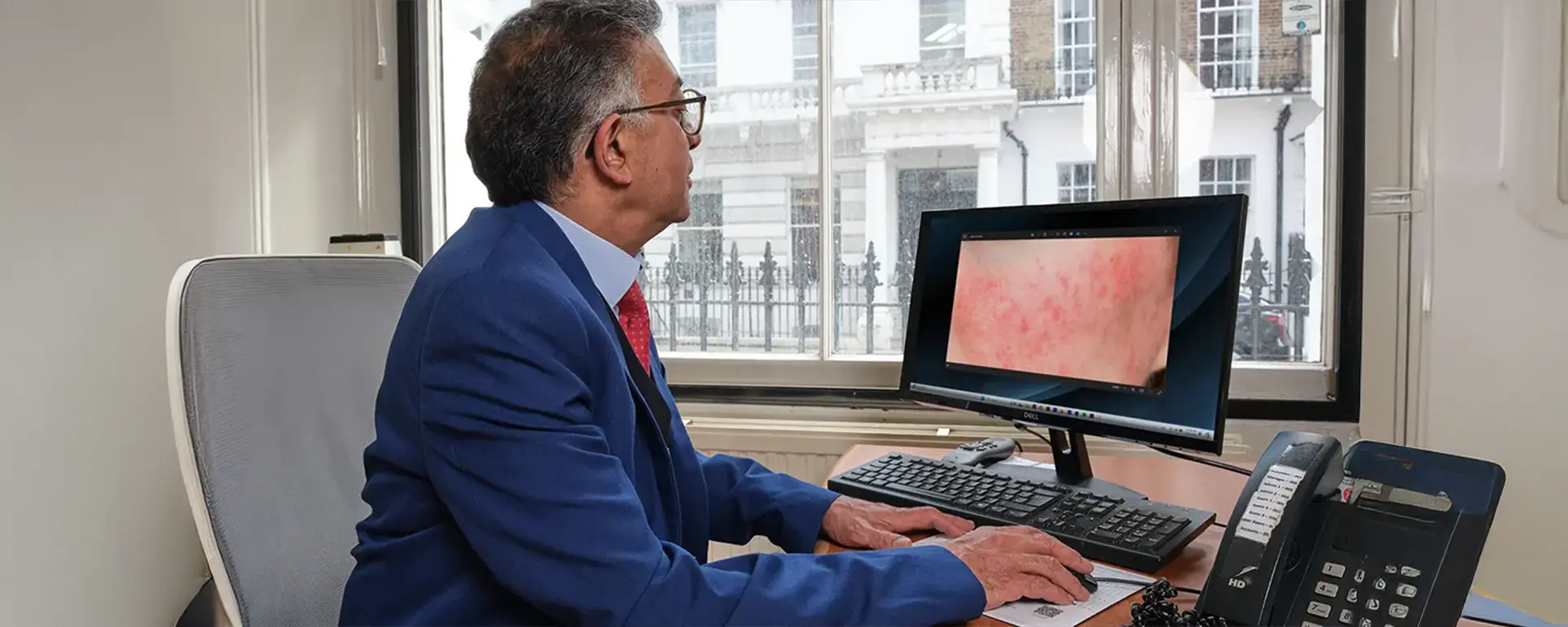Have you ever hesitated to book a dermatology appointment because you weren’t sure what to expect? You’re definitely not alone. Whether it’s anxiety over being judged, confusion about costs, or just not knowing what a dermatologist actually does, many people put off seeking help for their skin even when they really need it.
In a city as large and diverse as London, there’s no shortage of options for dermatological care. From busy NHS clinics to world-class private dermatology centres, you can find help for everything from acne and eczema to more complex concerns like skin cancer, psoriasis, or cosmetic procedures. But despite this access, a lot of people are still hesitant and that hesitation often comes down to misconceptions and misinformation.
Thanks to outdated stereotypes, social media myths, word-of-mouth rumours, and general lack of awareness, many Londoners hold back from seeing a dermatologist when they could be getting effective, personalised care. And the longer you delay treatment, the more likely a manageable issue can become something more difficult to treat.
So let’s set the record straight once and for all. Below are five of the most common myths I’ve heard about dermatologists in London and why it’s time to stop believing them and start prioritising your skin health.
Myth 1: “Dermatologists Only Treat Cosmetic Problems”
This is probably the most widespread and persistent misunderstanding and it couldn’t be further from the truth.
Yes, dermatologists do offer aesthetic treatments such as wrinkle-smoothing injections, chemical peels, laser resurfacing, and acne scar reduction. These services are often what people see on social media or in beauty magazines, which can make it seem like dermatology is purely cosmetic. But that’s only a small part of what they actually do on a daily basis.
In reality, dermatologists are fully qualified medical doctors who specialise in diagnosing, managing, and treating conditions that affect the skin, hair, and nails. Many spend years in advanced training beyond medical school, learning how to identify and treat complex skin disorders some of which can have serious implications for your overall health.
In fact, dermatologists are trained to treat more than 3,000 different conditions. These include:
- Chronic conditions like eczema, psoriasis, and rosacea
- Bacterial, viral, and fungal skin infections
- Suspicious moles, skin cancer, and pre-cancerous lesions
- Persistent acne that doesn’t respond to over-the-counter products
- Severe allergic skin reactions like contact dermatitis or hives
- Hair loss (including alopecia) and nail disorders like fungal infections or ridging
So, if you’re dealing with a mole that’s recently changed shape or colour, a stubborn rash that keeps returning, itchy patches that won’t heal, or unexplained hair thinning booking an appointment with a dermatologist is not only appropriate, it’s highly recommended.
They’re not just there to help you look better they’re there to help you get healthier, too.
Myth 2: “You Can Only Access a Dermatologist Through the NHS”

This is a common belief, especially among people who’ve never seen a dermatologist before but it’s simply not true.
While the NHS does provide dermatology services, and many people begin their skin health journey through their GP, it’s far from the only way to access expert care particularly in a large, well-connected city like London.
In fact, private dermatology clinics are widely available across the capital, ranging from small independent practices to internationally recognised centres of excellence. These clinics are staffed by fully qualified consultants many of whom also work within the NHS offering the same high standards of care in a more flexible setting.
Many people choose to go private for a variety of reasons, including:
- Faster access to appointments, sometimes even on the same week or next day.
- The ability to select a specific consultant or specialist based on experience or reputation.
- Longer consultation times, allowing for in-depth discussion, second opinions, and tailored treatment plans.
- A wider range of treatment options or medications that may not be immediately available through NHS pathways.
- Access to advanced diagnostic tools, such as full-body mole mapping, digital dermoscopy, or patch testing for allergies, which may not be routinely offered in every NHS clinic.
Private dermatology can also be especially helpful if you’re dealing with ongoing or unresolved skin issues, or if you simply want peace of mind and more control over your care.
Ultimately, whether you choose the NHS or a private route depends on your preferences, budget, and the urgency of your concerns. But the key takeaway is this: you absolutely have options and you don’t have to wait months just to get answers.
Myth 3: “Dermatologists Only Help with Acne”
This is a common assumption especially among younger patients or those who’ve only seen dermatology content online but it only scratches the surface of what dermatologists actually treat.
Yes, acne is one of the most frequent reasons people visit a dermatologist, and for good reason. It can be painful, distressing, and damaging to your confidence especially when over-the-counter products don’t work. But acne is just one of thousands of conditions that dermatologists diagnose and manage.
In London’s busy dermatology clinics, it’s not uncommon to see patients of all ages, backgrounds, and skin types coming in for help with a wide variety of issues. These can range from mild irritations to life-threatening conditions that require urgent care.
Some of the non-acne concerns that dermatologists commonly address include:
- Suspicious moles, skin tags, and early signs of skin cancer
- Severe eczema or atopic dermatitis that disrupts daily life
- Rosacea, flushing, and chronic facial redness that may worsen without treatment
- Persistent urticaria (hives) that recur for weeks or months
- Fungal infections like athlete’s foot, ringworm, or nail fungus
- Hair and scalp disorders, including conditions that cause hair thinning or bald patches
- Nail abnormalities such as discolouration, thickening, or ridging
- Hyperpigmentation, melasma, and other skin tone issues
And that’s just the beginning. Dermatologists are trained to recognise complex patterns and systemic conditions that may first show up through skin symptoms such as autoimmune diseases, hormonal imbalances, or allergic reactions.
So even if you’ve never had a breakout in your life, that doesn’t mean a dermatologist can’t help you. If something on your skin, scalp, or nails has changed or is making you uncomfortable, it’s always worth seeking expert advice. You don’t need to “wait for it to get worse” or try to self-diagnose early evaluation often leads to faster, more effective treatment.
Myth 4: “Private Dermatology Is Unaffordable”

This myth stops many people from even exploring private care. There’s a widespread assumption that private dermatology is an exclusive service reserved for celebrities, social media influencers, or the ultra-wealthy. The polished clinic interiors and high-end branding may add to this perception but it doesn’t reflect the full reality.
In truth, private dermatology in London is more accessible than most people think. With a growing number of independent practices and specialist centres across the city, there’s a broader range of price points than ever before. While costs are certainly higher than NHS care, they aren’t necessarily out of reach especially when you factor in the value of faster access and personalised attention.
Typically, initial consultations range between £200 and £300, depending on the clinic’s location, the complexity of your case, and the dermatologist’s experience or sub-specialism. Follow-up appointments and treatment plans may vary in cost, but clinics are usually upfront about fees and offer clear pricing structures so you can make informed decisions.
Here are a few reasons why many patients consider private dermatology a worthwhile investment:
- Quick access to appointments often within days rather than waiting weeks or months on an NHS list.
- Longer, more in-depth consultations, allowing you to fully explain your symptoms, ask questions, and receive tailored advice.
- Direct access to experienced consultants, often without needing a GP referral.
- More flexibility in choosing treatments, including the latest technologies and prescription options.
- Supportive follow-up care, with many clinics offering phone or email check-ins between appointments.
- Minimal waiting times on the day, with private clinics often running more punctually than overstretched NHS services.
If you’re worried about affordability, it’s also worth considering your private health insurance, if you have it through work or a personal policy. Many UK health insurance providers cover dermatology services especially when the reason for the visit is medical rather than cosmetic. Your policy might pay for some or even all of your consultation, tests, or treatment. It’s always a good idea to contact your provider beforehand to check what’s included and what steps you need to follow (such as obtaining a referral letter).
Even if you’re paying out of pocket, some clinics offer package deals, interest-free payment plans, or reduced rates for repeat visits. So before you rule it out, it’s worth doing a little research you might find that private dermatology is far more within reach than you’d imagined.
Myth 5: “You Need a GP Referral to See a Dermatologist”
This is another common misconception and while it does hold true in certain cases, it’s not a universal rule.
If you’re going through the NHS, then yes, you will typically need a referral from your GP before seeing a dermatologist. This helps ensure that NHS resources are used appropriately and that patients are seen by the right specialists at the right time. In some cases, your GP may be able to manage mild skin issues themselves or prescribe initial treatments before referring you on.
However, when it comes to private dermatology, the process is much more flexible and often far quicker. You can usually book a consultation directly with a dermatologist, without needing to speak to your GP first. This means you can take control of your care, avoid long waiting lists, and get expert advice at a time that suits you.
Direct booking can be especially helpful if you’re dealing with something that feels urgent or worrying, such as:
- A mole that’s recently changed shape, colour, or size
- A persistent rash that won’t respond to over-the-counter treatments
- Sudden hair loss, bald patches, or scalp irritation
- Chronic skin flare-ups, such as eczema or rosacea, that are affecting your quality of life
Booking directly with a private dermatologist can help you get answers quickly and reduce the anxiety that often comes with waiting. In some cases, early diagnosis and intervention can also prevent a condition from becoming more serious.
That said, your GP can still be a valuable first point of contact especially if you’re unsure about what’s going on with your skin, or if you’re trying to decide between NHS and private care. They can help you understand your symptoms, rule out other possible causes, and advise on the best route forward. And if you’re using private medical insurance, some providers may still require a GP referral for coverage so it’s always worth double-checking your policy details.
In summary: while a GP referral is necessary for most NHS dermatology services, it’s not a barrier in the private sector. If you’re concerned about a skin issue and want faster answers, you can often go straight to a qualified dermatologist without delay.
Frequently Asked Questions
- What does a dermatologist actually do?
A dermatologist is a medical doctor who specialises in diagnosing and treating skin, hair, and nail conditions. They handle everything from acne and eczema to skin cancer and surgical procedures. - Do I need a GP referral to see a dermatologist in London?
Not always. For NHS dermatologists, you’ll typically need a GP referral. However, you can usually book directly with a private dermatologist without seeing a GP first. - Is private dermatology care really expensive?
Not necessarily. Initial consultations at private clinics often start from £200–£300, and many clinics accept private health insurance which may cover part or all of the costs. - Can a dermatologist help with hair loss?
Yes. Dermatologists treat a range of scalp and hair conditions, including alopecia, dandruff, and hair thinning caused by hormonal or autoimmune issues. - What skin conditions are considered “medical” rather than cosmetic?
Medical dermatology includes conditions like eczema, psoriasis, skin infections, allergic rashes, rosacea, skin cancer, and nail disorders. - How quickly can I get an appointment with a dermatologist in London?
NHS wait times vary, but with private clinics, you can often get an appointment within a few days, especially if the issue is urgent. - Are dermatologists only for adults?
No. Dermatologists treat patients of all ages, including children with conditions like eczema, birthmarks, and warts. - What should I bring to my dermatology appointment?
Bring a list of your current medications, symptoms, photos of flare-ups (if any), and any questions you want to ask. It’s helpful to have your medical history available too. - Can a dermatologist perform minor surgery?
Yes. Many dermatologists perform minor surgical procedures, such as mole removal, cyst drainage, and skin biopsies, often in their clinics. - Will a dermatologist offer both medical and cosmetic treatments?
Many dermatologists offer both. You can get medical care for rashes, acne, or infections, as well as cosmetic services like chemical peels, fillers, and laser treatments.
Final Thought: Don’t Let Myths Hold You Back from Better Skin Health
Whatever your skin concern, you don’t need to feel uncertain or embarrassed about reaching out for professional help. Dermatologists in London are highly trained specialists who see a huge range of conditions every day from serious medical issues to cosmetic concerns. No issue is too small, too common, or too unusual to bring to their attention.
Whether you’re dealing with unexplained rashes, sudden hair loss, recurring acne, or a mole that’s changed, early evaluation can make all the difference. Getting expert guidance not only helps you manage symptoms but also brings peace of mind. And in many cases, the right treatment can improve both your comfort and confidence in daily life.
If you’d like support and expert advice, you can get in touch with us to book a consultation with one of our expert dermatologists in London. Your skin deserves the same level of care and attention as any other part of your health.
References:
- Magin, P., Pond, D., Smith, W. & Watson, A. (2005). A systematic review of the evidence for ‘myths and misconceptions’ in acne management: diet, face‑washing and sunlight. Family Practice, 22(1), pp.62–70. Available at: https://pubmed.ncbi.nlm.nih.gov/15644386/
- Basha, M.A. & Kishk, E.A.G. (2022). Acne from the adolescent patient’s beliefs and misconceptions: A review. International Journal of Health Sciences, 6(S4), pp.8057–8065. DOI: 10.53730/ijhs.v6nS4.10407. Available at: https://sciencescholar.us/journal/index.php/ijhs/article/view/10407
- Tan, J.K.L. & Bhate, K. (2015). A global perspective on the epidemiology of acne. British Journal of Dermatology, 172(1), pp.3–12. Available at: https://en.wikipedia.org/wiki/Acne
- Bal, Z.I., Karaosmanoglu, N., Temel, B. & Orenay, Ö.M. (2025). Trust in dermatologists versus social media influencers among acne patients. Cureus, 17(5), e83930. Available at: https://www.ncbi.nlm.nih.gov/pmc/articles/PMC12068905/
- Skin & Aging Journal editors (2011). 15 Acne Myths Addressed. Skin & Aging, (online). Available at: https://www.hmpgloballearningnetwork.com/site/thederm/site/cathlab/event/15-acne-myths-addressed
